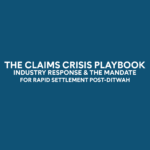Protecting Your Business in Uncertain Times with Comprehensive Coverage
Running a business in today’s dynamic environment is fraught with uncertainties. Companies face many risks, from economic fluctuations to natural disasters and cyber threats. To safeguard your enterprise and ensure its resilience, comprehensive insurance coverage is not just an option—it’s necessary.
In this article, we’ll explore how you can protect your business during uncertain times by leveraging the right insurance solutions.
1. Understanding the Risks Your Business Faces
Regardless of size or industry, every business is exposed to unique risks. Identifying these vulnerabilities is the first step in securing the proper coverage. Common risks include:
- Property Damage: Fire, floods, and other natural disasters can cause significant financial loss.
- Liability Claims: A customer injury, product defect, or legal dispute can result in costly lawsuits.
- Cybersecurity Breaches: With the increasing reliance on technology, businesses are more susceptible to data breaches and cyberattacks.
- Business Interruption: Unexpected events like pandemics or supply chain disruptions can halt operations, affecting revenue.
2. Key Insurance Policies for Comprehensive Coverage
To ensure your business is adequately protected, consider the following types of insurance:
- Property Insurance: Covers damage to your physical assets, including buildings, equipment, and inventory, due to fire, theft, or natural disasters.
- Liability Insurance: Protects your business against third-party claims for injury, property damage, or negligence. This includes:
- General Liability Insurance
- Product Liability Insurance
- Professional Indemnity Insurance
- Business Interruption Insurance: Compensates for lost income when your business cannot operate due to unforeseen events.
- Cyber Insurance: Provides financial protection against data breaches, ransomware attacks, and other cyber threats.
- Workers’ Compensation Insurance: Ensures your employees are covered for injuries or illnesses sustained on the job.
3. Tailoring Coverage to Your Business Needs
No two businesses are alike, and neither are their insurance needs. Work with a trusted insurance broker to create a customized insurance plan. Key considerations include:
- The size and nature of your business.
- The location and specific risks associated with it.
- Industry regulations and compliance requirements.
- Financial implications of potential risks.
4. Staying Proactive with Risk Management
While insurance provides financial protection, proactive risk management can minimize the likelihood of claims. Consider these strategies:
- Conduct Regular Risk Assessments: Identify vulnerabilities and address them promptly.
- Invest in Security Measures: Install security systems, implement cybersecurity protocols, and train employees on safety practices.
- Maintain Accurate Records: Keep detailed records of inventory, transactions, and safety protocols to streamline claims if needed.
5. Partnering with the Right Insurance Provider
The strength of your insurance coverage lies in the reliability of your provider. Choose an insurer with:
- A proven track record of prompt claims processing.
- Comprehensive product offerings tailored to businesses.
- Exceptional customer service and accessibility.
Conclusion: Secure Your Business’s Future Today
In uncertain times, comprehensive insurance coverage is a safety net that ensures your business can weather challenges and emerge stronger. You can protect your business’s financial health and reputation by understanding your risks, selecting tailored policies, and adopting proactive risk management strategies.
At TalkInsurance.lk, we’re committed to providing you with the knowledge and tools to make informed decisions about your insurance needs. Secure your business with the right coverage today to start 2025 with confidence.











Leave A Reply